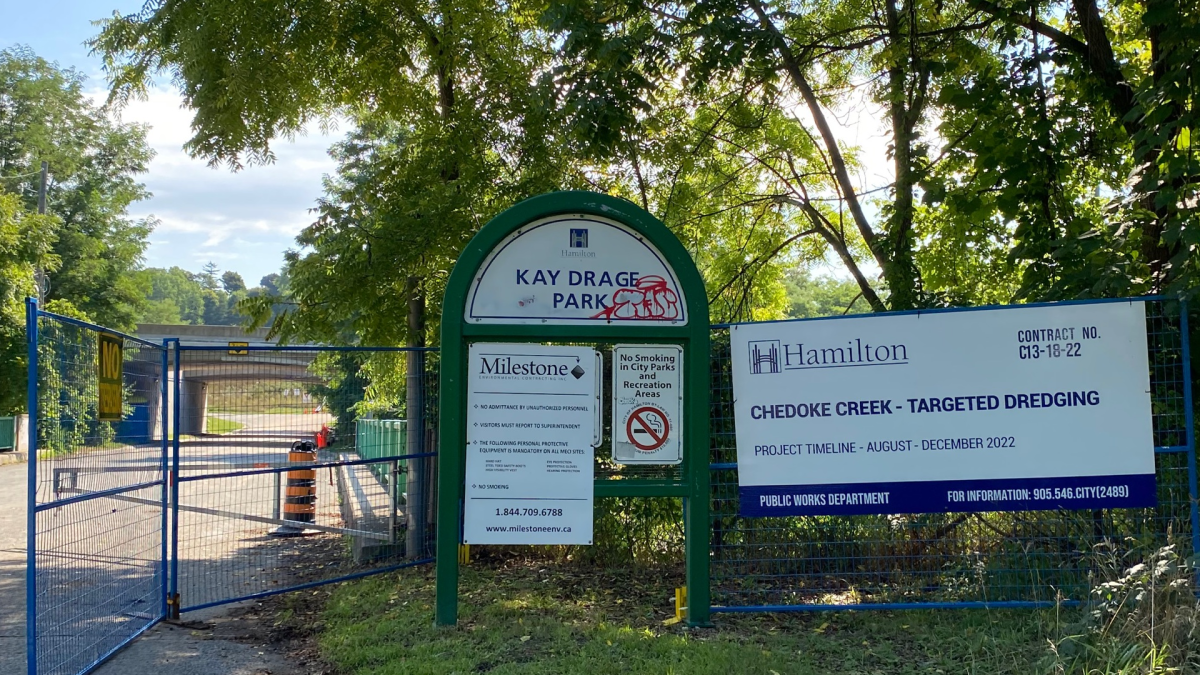Ontario’s Environment Ministry has agreed “in principle” to extend the deadline for the targeted dredging of Chedoke Creek, according to Hamilton’s director of watershed management.

Cari Vanderperk told councillors on Wednesday that the ministry is asking the city to review permitting implications and timing to understand when the project could feasibility restart.
“Once they are satisfied with the plan, they will provide a new deadline to the order,” Vanderperk said.
The city has been under orders from the Ministry of Environment, Conservation and Parks (MECP) to complete dredging of the creek to alleviate environmental impacts following the release of 24 billion litres of untreated wastewater between 2014 and 2018.
The city hopes to remove close to 11,000 cubic metres of contaminated sludge through a $6-million initiative it originally said would take six months to do and be completed by the end of 2022.
However, the project encountered a stoppage via Indigenous demonstrators who contested improper consultation with the Haudenosaunee Development Institute (HDI) – an agency representing the Haudenosaunee Confederacy Chiefs Council.
The HDI, in previous communications with the City of Hamilton, said the chiefs council didn’t recognize the provincial government’s jurisdiction.
In October, the city asked the ministry to issue an order preventing the HDI from causing any further disruptions.
Aaron Detlor, a lawyer representing the HDI, told Global News they were simply exercising treaty rights and were not to blame for any delays.
Detlor said the group was not intending to stop work, but wanted a consultation to have environmental monitors during the dredging at a cost to the city.
Hamilton’s director of water Nick Winters described the current dialogue with the HDI as “unique” and “confrontational” when compared with other Indigenous groups, including the Six Nations elected band council.
“Their relationship becomes very transactional,” Winters explained to councillors.
“Any consultation, there is a request for consent and financial compensation immediately as part of that process.”
In the meantime, Vanderperk revealed some expensive work equipment at the site is “demobilizing” for the winter but indicated the chosen contractor stands ready to be recalled at some point in 2023.
“This lowers our daily standby costs and ensures the equipment is secure until the project is restarted,” Vanderperk said.
“The contractor is committed to completing this project and has indicated they are able to be recalled within three to five days’ notice.”
MECP spokesperson Gary Wheeler confirmed to Global News in an email they are working with the city on a potential extension.
“The ministry is continuing discussions with the city on the details of an extension to ensure the required work is completed as quickly as possible to mitigate the water quality impacts,” said Wheeler.
City mulling over stormwater management fee to resolve aging infrastructure
Hamilton politicians have asked staff to evaluate options for creating a dedicated stormwater management fee.
The fee would be charged to property owners based on the amount of hard surfaces, such as roofs and parking lots, that direct rainwater into sewers.
The goal would be to cover an estimated $14-million-a-year funding gap to maintain Hamilton’s aging stormwater infrastructure.
Ian Borsuk of Environment Hamilton believes public opposition to a fee has “pretty much evaporated” amid a number of public flooding events, including the Chedoke Creek spill.
“People have become much more aware of what our stormwater system is and what it does, understanding that process and why it’s important to fund this system,” Borsuk said.
Borsuk adds that the fee would encourage “de-paving,” as well as the use of rain barrels and planting of trees.
Public consultations will begin next year before a final report is presented to councillors.








Comments